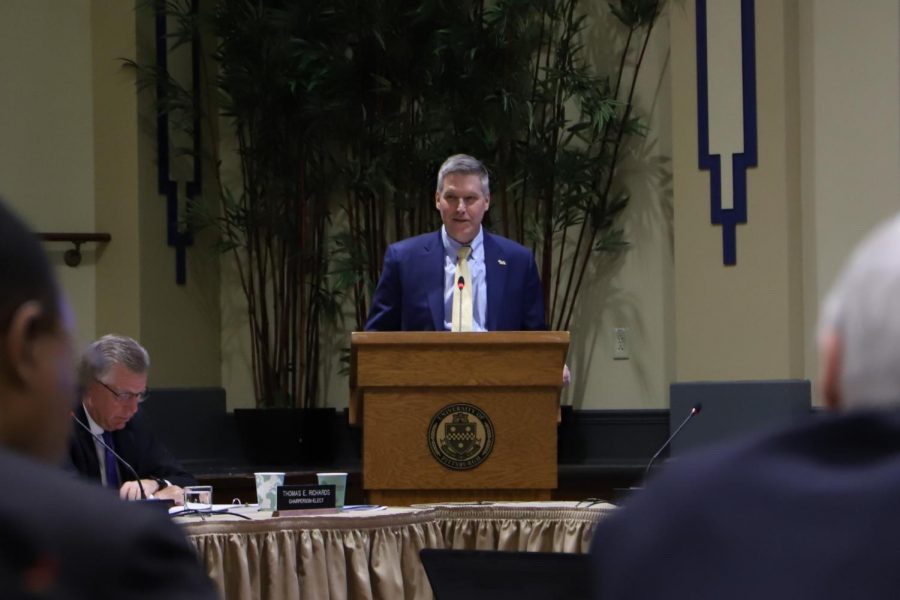Pitt administrators address George Floyd’s death, nationwide protests
Sarah Cutshall | Senior Staff Photographer
Chancellor Patrick Gallagher said Wednesday that Pitt will postpone Plan for Pitt 2025 in order to include strategies to strengthen racial equity justice on campus.
June 3, 2020
Chancellor Patrick Gallagher said in a Tuesday University-wide email that George Floyd’s death at the hands of Minneapolis police last Monday was an outrageous act of violence that requires action.
“It is impossible to forget the image of George Floyd, gasping for air as a police officer who is sworn to protect and defend calmly kneels on his neck until he dies,” Gallagher said. “We are outraged because it is outrageous.”
Floyd, a black man, died after white Minneapolis police officer Derek Chauvin knelt on Floyd’s neck for eight minutes as Floyd said he couldn’t breathe. Protests quickly erupted across the country including one Downtown on Saturday, and one in East Liberty on Monday. Chauvin was charged with third-degree murder and second-degree manslaughter last Friday.
Gallagher said in the email that the strategic Plan for Pitt 2025 will be put on hold indefinitely, after an initial six-month hold announced last month due to the COVID-19 pandemic, to include strategies to strengthen racial equity justice on campus.
Pitt spokesperson Kevin Zwick said the University hasn’t identified any specific actions to take immediately and is focused on community building.
“Our focus now is to offer meaningful ways for our community to come together and share ideas about creating a more equitable future at Pitt and beyond,” Zwick said. “We are looking for conversations with students, faculty, staff and community members to inform our specific strategies, and this work is just beginning.”
In his letter, Gallagher also criticized those inciting “violence” at protests.
“Some are happy to create confusion, sow conflict and incite violence and ultimately erode our fundamental rights to peaceably gather and demand real change,” Gallagher said. “Against a rising toll of injury, death and recrimination, we stand to lose our solidarity — replacing it with ever-deepening divisions.”
Gallagher said Pitt is not immune from similarly racist attacks.
“Yet, for all of our remarkable accomplishments, African Americans living within the Cathedral of Learning’s shadow are still confronting an alarming opportunity gap,” Gallagher said. “Our University must become a better, more equitable place, and we can do more.
Gallager said postponing the release of Plan for Pitt 2025 is the best decision to allow the University to seek input from students and experts to strategize the best ways to promote racial justice.
“We are scheduling and planning a number of opportunities to convene virtually so that we can share ideas, experiences and expertise related to eliminating racism and injustice near and far,” Gallagher said.
To discuss possible University actions, the Office of Diversity and Inclusion and Office of Health Sciences Diversity are hosting the “I Can’t Breathe: From Agony to Activism” virtual town hall Wednesday from noon to 1:30 p.m., featuring officials from across the University.
In her statement, Provost Ann Cudd echoed a similar resentment regarding police brutality targeted against African Americans and concern for students’ safety.
“I am especially concerned about our students, faculty and staff members of color,” Cudd said. “The killings of George Floyd, Ahmaud Arbery, Breonna Taylor, like so many before them, send the false and racist message that Black lives do not matter.”








